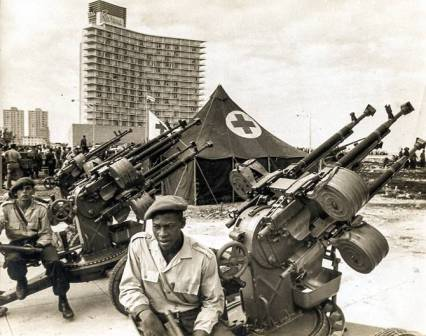
"...A people that did not tremble in the October Crisis, that people can never be defeated." That is how the historic leader of the Cuban Revolution Fidel Castro referred to the courage of the Cubans in those days of 1962, when one of the most serious incidents of the Cold War period took place.
By María Josefina Arce
"...A people that did not tremble in the October Crisis, that people can never be defeated." That is how the historic leader of the Cuban Revolution Fidel Castro referred to the courage of the Cubans in those days of 1962, when one of the most serious incidents of the Cold War period took place.
Those were days of great tension, when the world was on the brink of nuclear war. Much has been said about the so-called "Missile Crisis", which made clear the Cuban people's decision to defend their independence and Fidel Castro's transparent and pro-diplomatic stance.
Those critical days were preceded by the reinforcement of the aggressive policy of the United States towards the nascent Cuban revolution, which still continues, although with other scenarios in the background.
After the failure of the mercenary invasion of Playa Girón in April 1961, financed by Washington, the obsession with the largest of the Antilles grew and actions against our country were intensified to undermine its economy and isolate it from the regional system.
At the end of 1961, Operation Mongoose was born, a plan of covert operations aimed at creating a pretext for a U.S. invasion of the Caribbean nation.
In that context, the then Soviet Union proposed to station a contingent of its troops in Cuban territory, with medium-range nuclear rockets capable of covering the United States, as a form of deterrence and also to eliminate the advantage Washington had with its missiles in Turkey, Italy and the United Kingdom.
Historians recall that although the proposal surprised and did not entirely please Fidel, an ethical consideration, to help the Soviet Union, led him to accept. But he always insisted that the installation of that armament in our territory be made public, since it was totally legal and in strict compliance with international law.
In an interview with Spanish intellectual Ignacio Ramonet for the book "One Hundred Hours with Fidel", the historic leader of the revolution recalls that between October 14 and 15, U.S. spy planes flew over Cuban territory and photographed the launching ramps.
This triggered the crisis, which intensified as the days went by, supported by the bellicose propaganda on U.S. soil. Shortly afterwards, President John F. Kennedy decreed a naval blockade against Cuba, which immediately mobilized in the face of the threat.
Days later, an agreement was reached between the United States and the Soviet Union, without Cuba, which was truly unacceptable.
In those critical days of October 1962 the Cuban people grew up, they did not hesitate, the integrity of the Homeland was at stake. As the Heroic Guerrilla Ernesto Che Guevara pointed out, in those days all of Cuba was a Maceo, a hero of our independence, known for his courage, bravery and patriotic intransigence.

